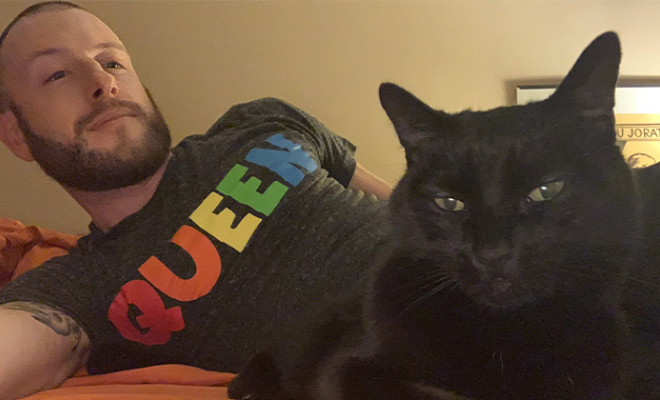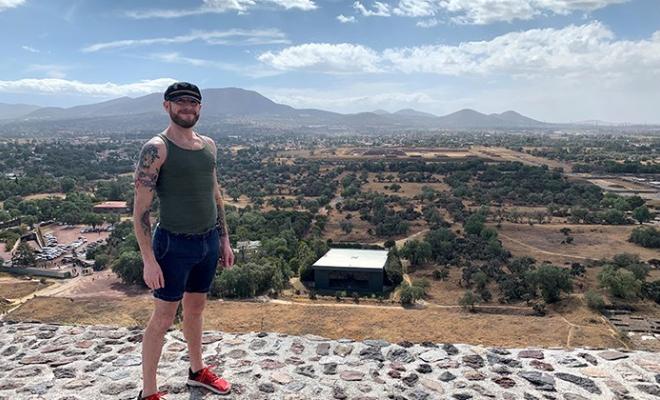Being gay is a lot like living with cystic fibrosis. A LOT.
I just typed out the phrase, “Growing up in the 80s and 90s“ and when I read it back to myself, I got shivers — actual goosebumps. Many of our CF brothers and sisters didn’t make it through the 80s and 90s. I turned 40 last summer — an unimaginable feat for someone who was told time and time again that “this year could be the last.” During the 80s and 90s, an entire generation of gay men were killed due to AIDS. When I was a teen exploring my sexuality (and, quite honestly, well into my 20s) every time I had a sexual encounter, the threat of AIDS numbed my vulnerability. My idea of what CF meant did that, too. How could I really be intimate, loving, and committed to another person if I wouldn’t be there for them? Why does the threat of death disconnect us?
As a 10-year-old growing up in Maine, I was so ashamed of my CF. I felt so alone — we didn’t have Instagram or Tik Tok to connect with others and share our similarities. It seemed as if I was the only person on the planet with CF. And, as all of you know, the symptoms of this disease feel so gross, unlikable, and, above all — a detriment to fitting in. Hello — I’m a 90210 kid!
Speaking of fitting in, I did not. As a child, I was not the standard of masculinity. I wasn’t Brandon Walsh or Dylan McKay. I played a whole bunch of make believe, sang songs, and pranced around. I felt an attraction to other boys at a very young age, but I had no gay role models. And the overall messages during those decades were not supportive of the LGBTQA community.
To be unhealthy and not straight in this country felt very lonely.
Over time, I found community with other gay and queer people. I began to find ways to like myself. Opening up — allowing people to see me for who I was and learning that I was relatable and likable — enabled me to love my gayness. I struggled to piece myself together for many years. Just like my various hair (Manic Panic, anyone?) and clothing styles, over time and after many mistakes I recognized which pieces of my personality felt most authentic.
Another idea that I struggled with for so long was that I was unworthy of love. I had to come to trust — really trust — that the people in my life loved me, despite all the dangerously high expectations I held over myself. Today, because I know my choices are in line with my most authentic self, I’m very proud of the work I do and my commitment to friends and family.
It took me longer to associate the feeling of pride with cystic fibrosis. I think that had to do with not having a community for so long. The strict 6-feet-apart rule felt more like 1,000 miles. Most people don’t understand what it’s like to grow up with a chronic, deadly disease and not know anyone else like you. There wasn’t a character on TV with CF or movies about CF. Where are our CF heartthrobs?!
Thank GOD for the internet (maybe not ALL the internet — we could do without Twitter and Grindr), helping all us CF survivors and warriors support and uplift each other in ways that we just couldn’t do 30 or 40 years ago. I met my first CF friend around 2010. She is outgoing, loud, silly, outspoken — all the attributes that I didn’t know I could be. Sharing tears, laughs, and the ability to vent with someone else who also was living with CF changed my whole life. When I didn’t have Creon®, she hooked me up. When I needed new doctors, she introduced me to her care team at Boston Children’s Hospital. My pride for her allowed me to let go of the resentments I had for my disease.
Today, I’m proud of these 40-year-old lungs. I’m proud that my body survived all the intestinal surgeries and breathing treatments. And I’m proud that I can show up for my disease, for others with CF, and for friends experiencing chronic illness.
June is LGBTQA Pride Month. It’s an important month. It’s a month when I remember who I am, who came before, the hope the community inspires … and also rainbow flags, self-expression, and excitement. I will be marching in the New York City Gay Pride Parade with my sober brothers and my partner. I think about all those people who died in the early years of the AIDS epidemic who could have been my role models. I think of the (at least) 12 transgender people who have been murdered in 2022. These beautiful people were living their authentic selves out loud. I am inspired by the spectrum of sexuality and all the various ways my community celebrates who they are. I am grateful for this life I’ve been given and for the opportunity to be a role model for queer children and kids living with CF. Today, I choose to stay connected.
Interested in sharing your story? The CF Community Blog wants to hear from you.





